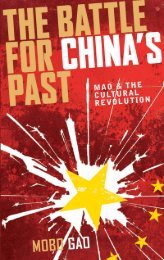Adam Smith's Critique of International Trading ... - Political Theory
Adam Smith's Critique of International Trading ... - Political Theory
Adam Smith's Critique of International Trading ... - Political Theory
You also want an ePaper? Increase the reach of your titles
YUMPU automatically turns print PDFs into web optimized ePapers that Google loves.
Muthu / Smith’s <strong>Critique</strong> <strong>of</strong> <strong>International</strong> <strong>Trading</strong> Companies 199<br />
to travel to India as part <strong>of</strong> a commission <strong>of</strong> supervision that the Company<br />
had proposed in 1772 to investigate its administration in Bengal and to<br />
determine to what extent it had engaged in illegal or unjust conduct. In the<br />
end, however, due to objections from Parliament, which wanted to inquire<br />
further into the Company’s activities itself, the Company shelved its commission<br />
plans. 28 Smith continued to follow the affairs <strong>of</strong> the Company<br />
closely and studied the history and the economic and political character <strong>of</strong><br />
other international trading companies as well. The most substantial addition<br />
made to WN, after its initial publication in 1776, was a section on the organization<br />
and development <strong>of</strong> such companies in Britain that was inserted in<br />
the third edition <strong>of</strong> 1784. 29<br />
Smith in effect took sides in the pamphlet wars about the East India<br />
Company by treating its operations abroad as imperial, as wielding sovereign<br />
power. He thus tacitly affirmed the notion that many <strong>of</strong> the princely<br />
realms <strong>of</strong> India were client-states <strong>of</strong> the Company and denied the claims <strong>of</strong><br />
the Company’s defenders at the time that its activities in the East Indies<br />
were purely commercial and that its role in Indian affairs was conducted by<br />
way <strong>of</strong> treaties with independent Indian rulers. Indeed, the “late war” (the<br />
Seven Years’ War), which as he notes constituted a world war, “was altogether<br />
a colony quarrel” among the leading European states (IV.vii.c.64;<br />
615), though they fought not only to secure sovereign power, but crucially,<br />
since such power was now intimately bound up with global commerce<br />
and the influence <strong>of</strong> the transnational merchants, also to safeguard<br />
and to enlarge the interests <strong>of</strong> international trading companies. As Smith discusses,<br />
the East India Company’s own security forces—that is, its armies—<br />
fought in the Indian theater <strong>of</strong> the war, which put to an end any significant<br />
French presence in India and helped to establish the dominance <strong>of</strong> the<br />
Company in the subcontinent. The institutions <strong>of</strong> global commerce were<br />
now helping to fuel global wars, hardly the enlightened doux commerce that<br />
transnational trade was sometimes said to promote.<br />
Smith contends that the true character—or, as he sarcastically describes<br />
it, the “natural genius”—<strong>of</strong> international trading companies reveals itself<br />
most fully in their role as sovereigns abroad. Commenting upon both the<br />
English and Dutch companies and their “considerable conquests in the East<br />
Indies,” he asserts that “the manner in which they both govern their new<br />
subjects” demonstrates the inherent pathologies <strong>of</strong> transnational companies<br />
and their exclusive privileges (IV.vii.c.101; 635). It is both the imperial<br />
character that they have taken on and the underlying flaws <strong>of</strong> such companies,<br />
as happen to be exemplified in their imperial exploits, that Smith<br />
intends to examine. The destructive tendencies <strong>of</strong> these companies is a
















